|
|
|
Sort Order |
|
|
|
Items / Page
|
|
|
|
|
|
|
| Srl | Item |
| 1 |
ID:
029429
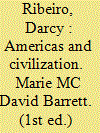

|
|
|
|
|
| Edition |
1st ed.
|
| Publication |
London, George Allen and Unwin Ltd., 1969.
|
| Description |
510p.hbk
|
| Standard Number |
004390025
|
|
|
|
|
|
|
|
|
|
|
|
Copies: C:1/I:0,R:0,Q:0
Circulation
| Accession# | Call# | Current Location | Status | Policy | Location |
| 007839 | 973/RIB 007839 | Main | On Shelf | General | |
|
|
|
|
| 2 |
ID:
110324
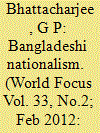

|
|
|
| 3 |
ID:
121032
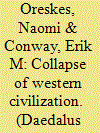

|
|
|
|
|
| Publication |
2013.
|
| Summary/Abstract |
Science fiction writers construct an imaginary future; historians attempt to reconstruct the past. Ultimately, both are seeking to understand the present. In this essay, we blend the two genres to imagine a future historian looking back on a past that is our present and (possible) future. The occasion is the tercentenary of the end of Western culture (1540 - 2073); the dilemma being addressed is how we - the children of the Enlightenment - failed to act on robust information about climate change and knowledge of the damaging events that were about to unfold. Our historian concludes that a second Dark Age had fallen on Western civilization, in which denial and self-deception, rooted in an ideological fixation on "free" markets, disabled the world's powerful nations in the face of tragedy. Moreover, the scientists who best understood the problem were hamstrung by their own cultural practices, which demanded an excessively stringent standard for accepting claims of any kind - even those involving imminent threats. Here, our future historian, living in the Second People's Republic of China, recounts the events of the Period of the Penumbra (1988 - 2073) that led to the Great Collapse and Mass Migration (2074).
|
|
|
|
|
|
|
|
|
|
|
|
|
|
|
|
| 4 |
ID:
067549
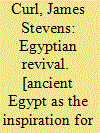

|
|
|
|
|
| Publication |
London, Routledge, 2005.
|
| Description |
xxxvi, 572p.Pbk
|
| Standard Number |
0415361184
|
|
|
|
|
|
|
|
|
|
|
|
Copies: C:1/I:0,R:0,Q:0
Circulation
| Accession# | Call# | Current Location | Status | Policy | Location |
| 050567 | 909.09812/CUR 050567 | Main | On Shelf | General | |
|
|
|
|
| 5 |
ID:
001184
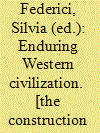

|
|
|
|
|
| Publication |
Westport, Praeger Publishers, 1995.
|
| Description |
xvi, 208p.Hbk
|
| Contents |
Includes bibliography, references and index.
|
| Standard Number |
0275951545
|
|
|
|
|
|
|
|
|
|
|
|
Copies: C:1/I:0,R:0,Q:0
Circulation
| Accession# | Call# | Current Location | Status | Policy | Location |
| 040704 | 909.09812/FED 040704 | Main | On Shelf | General | |
|
|
|
|
| 6 |
ID:
130859
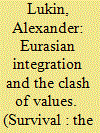

|
|
|
|
|
| Publication |
2014.
|
| Summary/Abstract |
Putin has now established an independent power centre in Eurasia. Although economic considerations are important, they are also secondary to a set of values differing from those preached by the West.
Since the Enlightenment, the driving concepts of Western civilisation have been the belief in its own superiority and the theory of linear progress in human society. According to this understanding, the West (firstly Europe, and later the United States) reached the highest and most advanced level of development, with all other countries moving along the same continuum, although lagging behind and located at various stages of proximity to this ideal.
In fact, many civilisations have considered themselves superior to others. The Ancient Greeks, Romans, medieval Chinese and many others all believed that they had reached the pinnacle of social development. However, the last few centuries of industrial success and military power have reinforced the theory of the West's superiority, with the result that Western notions of progress have long captured the thinking of most of the world.
|
|
|
|
|
|
|
|
|
|
|
|
|
|
|
|
| 7 |
ID:
133837
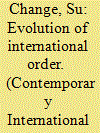

|
|
|
|
|
| Publication |
2014.
|
| Summary/Abstract |
Current international order results from accumulation of different kinds of order in history. They were interconnected regional orders of integrated civilizations centered on a core country.
|
|
|
|
|
|
|
|
|
|
|
|
|
|
|
|
| 8 |
ID:
102700
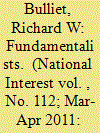

|
|
|
|
|
| Publication |
2011.
|
| Summary/Abstract |
MANY PEOPLE believe the world is-or should be-reaching a consensus on the universal and inevitable superiority of the rationalistic, humane and rights-based values of Western civilization.
|
|
|
|
|
|
|
|
|
|
|
|
|
|
|
|
| 9 |
ID:
118791
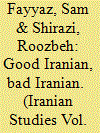

|
|
|
|
|
| Publication |
2013.
|
| Summary/Abstract |
This article analyzes the ways in which Iran and Iranians are represented in Western news media sources. Through detailed textual analysis of articles in Time and Newsweek between 1998 and 2009, it demonstrates that journalistic representations of Iran and Iranians are not simply efforts aimed at describing the real Iran, but rather form the basis of what Said refers to as a powerful "community of interpretation" that often reflects and reproduces certain xenophobic stereotypes of non-Western foreign subjects. While some shifts in Western media representations of Iranians have occurred in the thirty years since the revolution, the underlying ontological assumptions of these representations have remained remarkably durable. That is to say, the dominant representational discourse found in these newsmagazines depicts the political behavior of Iranians on the basis of essentialized notions of Persian and/or Islamic civilization, while very often emphasizing the taken for granted superiority of the West. Earlier Orientalist discourses focus on the difference of non-Western foreign subjects by denigrating them as fundamentally anti-modern and incapable of political, cultural and economic development without Western intervention. This article presents an unmistakable discursive pattern in American journalism whereby certain Iranians
|
|
|
|
|
|
|
|
|
|
|
|
|
|
|
|
| 10 |
ID:
054246
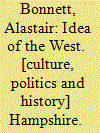

|
|
|
|
|
| Publication |
Hampshire, Palgrave Macmillan, 2004.
|
| Description |
x, 201p.Pbk
|
| Standard Number |
1403900353
|
|
|
|
|
|
|
|
|
|
|
|
Copies: C:1/I:0,R:0,Q:0
Circulation
| Accession# | Call# | Current Location | Status | Policy | Location |
| 048754 | 909.0982/BON 048754 | Main | On Shelf | General | |
|
|
|
|
| 11 |
ID:
151054
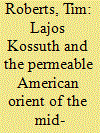

|
|
|
|
|
| Summary/Abstract |
Hungary for antebellum Americans was difficult to characterize as a part of ‘western civilization,’ or outside it, as part of the ‘Orient.’ The Hungarian nationalist Lajos Kossuth brought not only Hungary but the larger ‘Orient’ into sharper relief. Kossuth was popular for hailing America as a model of a successful revolutionary republic. But he was also an ‘Oriental,’ arriving in the United States via rescue from Austria by the Ottoman Empire. Kossuth’s complicated celebrity challenged Americans’ understanding of Hungary as a ‘border’ nation, the Ottoman Empire as a symbol of eastern stagnation, and even Austria as a part of ‘Europe.’ In their encounter with the trans-civilizational figure Kossuth, Americans revealed a sense of themselves as part of ‘western civilization,’ but different from Europeans in their ties to liminal places like Hungary and the Ottoman Empire: ‘West’ and ‘East’ were permeable. These connections provided reassurance in an era when Americans were growing more conflicted about their place in the world.
|
|
|
|
|
|
|
|
|
|
|
|
|
|
|
|
| 12 |
ID:
118729
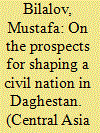

|
|
|
|
|
| Publication |
2012.
|
| Summary/Abstract |
Russia's integrity depends on ensuring civil identity as a priority factor in the development of society and the individual. Civil identity is fully realized in a civil nation that gradually takes shape within a particular society. The crisis of multiculturalism in the West triggered by the crisis of the European civilization and culture calls for a revision of certain ideas and theories associated with civil identity.
|
|
|
|
|
|
|
|
|
|
|
|
|
|
|
|
| 13 |
ID:
095102
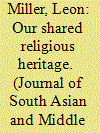

|
|
|
| 14 |
ID:
135687
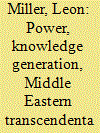

|
|
|
|
|
| Summary/Abstract |
twentieth century scholars have analyzed the middle east from a number of perspectives ranging from geopolitics, security studies, conflict studies, the Palestine-Israel conflict, fundamentalism (The War on Terror), and in connection with oil (Global political Economy). But it has only been recently that a small number of scholars have begun to research the interface between current trends in the Middle East (and North Africa) and corresponding current challenges that Western Civilization is confronted with.
|
|
|
|
|
|
|
|
|
|
|
|
|
|
|
|
| 15 |
ID:
095805
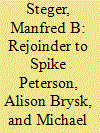

|
|
|
|
|
| Publication |
2010.
|
| Summary/Abstract |
I greatly appreciate the opportunity to offer a brief rejoinder to the three thought-provoking responses to my essay based on my recent study, The Rise of the Global Imaginary. Needless to say, each response contains a number of astute observations and cogent criticisms that will serve as useful catalysts for the further development of my ongoing work on the subjective and ideational dimensions of globalization. At the same time, however, I must also confess that I spotted a few passages in these responses that seem to have missed or misconstrued my arguments. Given the obvious spatial limitations of this rejoinder, however, I cannot cover all of these points. Rather, I am forced to take the rather selective approach of focusing on what strike me as the most crucial interventions while neglecting others that might be equally worthy of comment.
|
|
|
|
|
|
|
|
|
|
|
|
|
|
|
|
| 16 |
ID:
133559
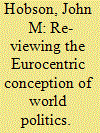

|
|
|
|
|
| Publication |
2014.
|
| Summary/Abstract |
This article responds to the five forum pieces that critically engage my 2012 book The Eurocentric Conception of World Politics, the central argument of which is that ever since 1760 international theory has not provided ideologically neutral, universalist explanations of world politics but has been charged, or even mandated, with the provincial objective of defending, promoting or celebrating Western civilization as the highest referent of the world. The first section defends the book's claim that pre-1945 realism was founded largely on various scientific racist bases (specifically between 1889 and 1945) - what I call 'racist realism' - while the second section defends my claim that classical realism and neorealism are not culturally neutral, universal approaches but are grounded in an underlying Western provincialism. The third section defends my reading of three pioneering figures of IR, John Burgess, Paul Reinsch and J.A. Hobson, while the fourth section reframes my non-Eurocentric reading of international theory in the last 250 years through a gendered lens so as to flesh out how gender/patriarchy and racism/Eurocentric institutionalism are mutually embedded, polymorphous discourses. Finally, the conclusion tackles the dual criticism that the book is limited by its Anglo-centric focus, on the one hand, and its situation within a critical tradition that is inherently European, if not Eurocentric, on the other
|
|
|
|
|
|
|
|
|
|
|
|
|
|
|
|
| 17 |
ID:
151300
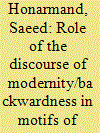

|
|
|
| 18 |
ID:
108227
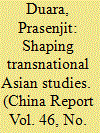

|
|
|
| 19 |
ID:
121557
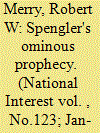

|
|
|
|
|
| Publication |
2013.
|
| Summary/Abstract |
A QUESTION haunts America: Is it in decline on the world scene? Foreign-policy discourse is filled with commentary declaring that it is. Some-Parag Khanna's work comes to mind-suggests the decline is the product of forces beyond America's control. Others-Yale's Paul Kennedy included-contend that America has fostered, at least partially, its own decline through "imperial overstretch" and other actions born of global ambition. Still others-Robert Kagan of the Brookings Institution and Stratfor's George Friedman, for example-dispute that America is in decline at all. But the question is front and center and inescapable.
|
|
|
|
|
|
|
|
|
|
|
|
|
|
|
|
| 20 |
ID:
132514
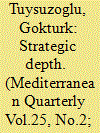

|
|
|
|
|
| Publication |
2014.
|
| Summary/Abstract |
The change in Turkish foreign policy in the twenty-first century's second decade has its origin in the approach referred to by Turkish foreign minister Ahmet Davutoglu as Strategic Depth. Because it aims to give Turkey status as a Eurasian power, this approach has been described as neo-Ottomanism, referencing the geographic extent of the Ottoman Empire. Because of its intrinsic pragmatism and the geographical region that is its focus, Strategic Depth has been influenced by Eurasianist thought in Russia. But the Strategic Depth approach differs from Russian Eurasianist ideas because it refuses to place itself in conflict with Western civilization and instead positions Turkey as a bridge between Western and Muslim civilizations. To this extent, Strategic Depth may be described as a conservative interpretation of Turkish Eurasianism.
|
|
|
|
|
|
|
|
|
|
|
|
|
|
|
|
|
|
|
|
|